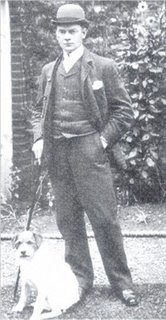Jerome K. Jerome

Comic author Jerome Klapka Jerome was born on this day in 1859 in Walsall, Staffordshire, England.
Given the middle name "Klapka" after Georg Klapka (hero of the Hungarian revolution, who was staying in his parents' home at the time of his birth), Jerome K. Jerome was brought up in London's East End in relative poverty. At 14, after his father's death, Jerome went to work as a railway clerk at Euston Station, but eventually he became an actor, spending 3 years touring with a regional stage company -- proudly noting he played every part in Hamlet except "Ophelia."
He returned to London and began stringing for the newspapers, eventually writing humorous sketches for Home Chimes (1885) and The Playgoer (1886) and a few modestly successful plays. One series of articles for Home Chimes, which Jerome purportedly began as an earnest travelogue, became the classic comic novel Three Men in a Boat (1889), about 3 city clerks going on a row-boat tour of the Thames -- a series of farcical incidents strung together through a warm meditation on the river and its sights.
His reputation as a writer firmly established, he became co-editor of The Idler (1892) and then founded To-day (1893-8), a weekly illustrated paper which became the platform for his leftist views; since the 1880s, when he first encountered Prince Kropotkin and befriended Fabian Society members H.G. Wells and George Bernard Shaw, he was active in Socialist causes, although later in life he settled into a more moderate liberalism.
After another successful play (Miss Hobbs, 1899), Jerome moved to Dresden for two years, taking the opportunity to reprise his Three Men characters in a comic novel about the now middle-aged professionals on a cycling tour of the Black Forest in Three Men on the Bummel (1900). He returned from Germany in 1902 and wrote a more somber piece, a loosely autobiographical novel of the East End slums, Paul Kelver (1902).
After completing the play The Passing of the Third Floor (1907), Jerome went on a lecture tour of the U.S., where he spoke out against lynchings of blacks in Chattanooga. During World War I, he strongly denounced the British anti-German propaganda campaign (which alienated him from his old friend Wells), but went to France in 1916 to contribute to the effort as a volunteer ambulance driver. He died on June 14, 1927 in Northampton, England.
Like Mark Twain (whom Jerome once met during a visit Twain made to London), Jerome's literary double-life of humor and scathing political discourse ocassionally got him into hot water; yet, also like Twain, whose humanism has secured him a place of honor in the American pantheon of humorists, it is a testament to Jerome's humanism that his Three Men stories continue to be warmly appreciated by the British. Three Men and a Boat has been filmed several times, notably with Laurence Harvey (1956) and Monty Python's Michael Palin (1975).
Labels: Literature





3 Comments:
Hey, Ron-san:
curious about your hucksterism file, I ran an ego surf on heaven tree. what i found underscored perhaps the uselessness of the program: heaven tree with heaventree.blogspot.com has 980 egp points. heaven tree with heaventree.wordpress.com has 2571 ego points. and heaven tree with heaventre.blogspot.com AND heaventre.wordpress.com has 1332 ego points. and you'd think these things are cumulative? :-)
I guess i was right all along: just do a good blog and don't worry about the ratings. ;-)
That's a bit of hucksterism that has outlived its usefulness, surely. If I ever manage to get over my procrastination regarding such matters, I will be sure to eliminate it from my template.
In the meantime, I enjoy reading your blog a great deal, so be sure and credit yourself with all the Parlour Tricks points you'd like.
Thanks!
Post a Comment
Subscribe to Post Comments [Atom]
<< Home